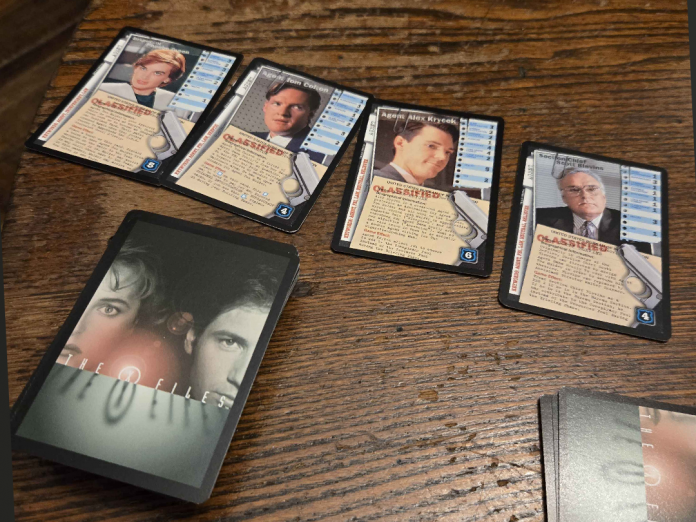In late 1996, The X-Files was a pop culture juggernaut. The fourth season had just begun. Fans were still scarred from the first airing of “Home”. The theatrical motion picture went into production. There was only one logical step to take next. There had to be a collectible card game.
I Want To Believe
My parents were cool enough to let ten year old Fowler watch every episode from the beginning. I was enraptured. The vibes were immaculate. Somehow, The X-Files CCG manages to capture those immaculate vibes, and it is bursting with details from the show. There are cards covering just about everything from the first three seasons of the show; Alex Krycek, the Stupendous Yappi, government-issued vehicles, mysterious beasts, and government cover-up plots. It was developed by NXT games and published by the US Playing Card Company. The game debuted in 1996 and ran until 1998, receiving only three release rounds.
Deny Everything
At its core, the X-Files CCG is a deduction game. In many ways, it feels like an X-Files branded and more mechanically complex Clue. At the beginning of the game, each player selects an X-File. The objective is to keep yours secret, while exposing your opponent’s by passing skill checks and asking questions. X-Files have four characteristics (affiliation, motive, method, & result), each of which has four types. For example, nightmare-fuel flukeman The Host has affiliation: evolutionary, motive: survival, method: violence, and result: physiological imbalance. Progress is tracked by way of a sheet that contains all of the X-Files. During the course of the game, players will get chances to ask questions about a particular affiliation – to be answered by their opponent with a yes or no.
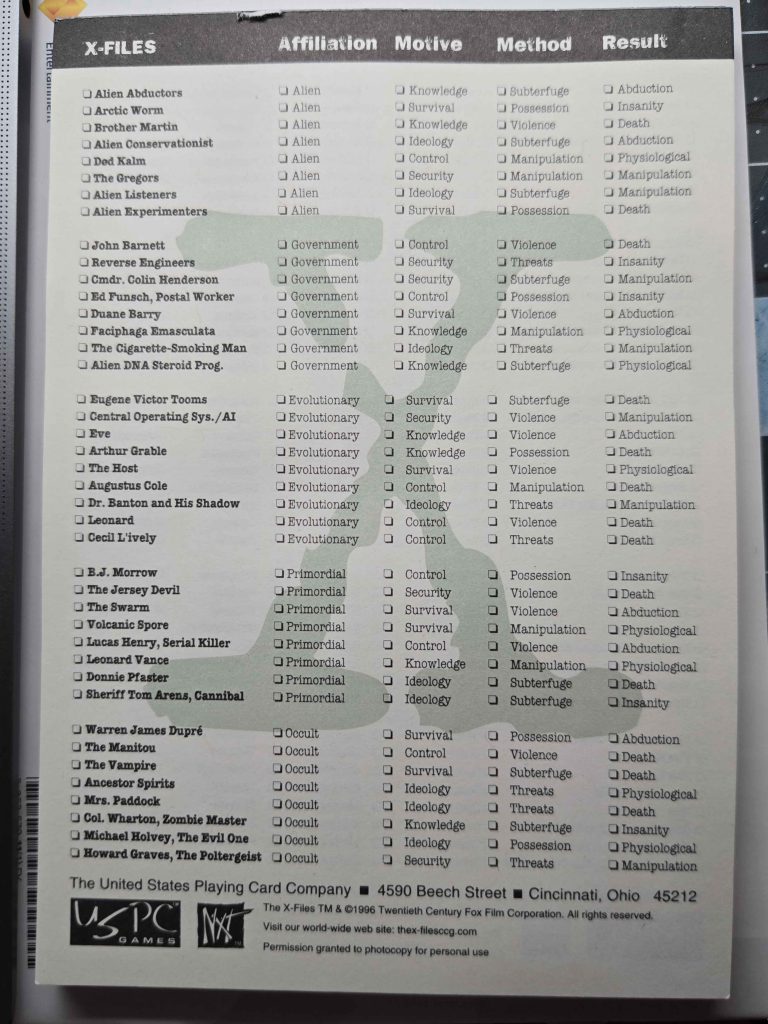
The investigations are conducted by agents. Each player chooses four agent cards that are set aside at the beginning of the game. Each agent has scores for a number of skills: for example, Agent Scully has a score of 4 for Medical. This means that she adds 4 to a skill check with the medical keyword.
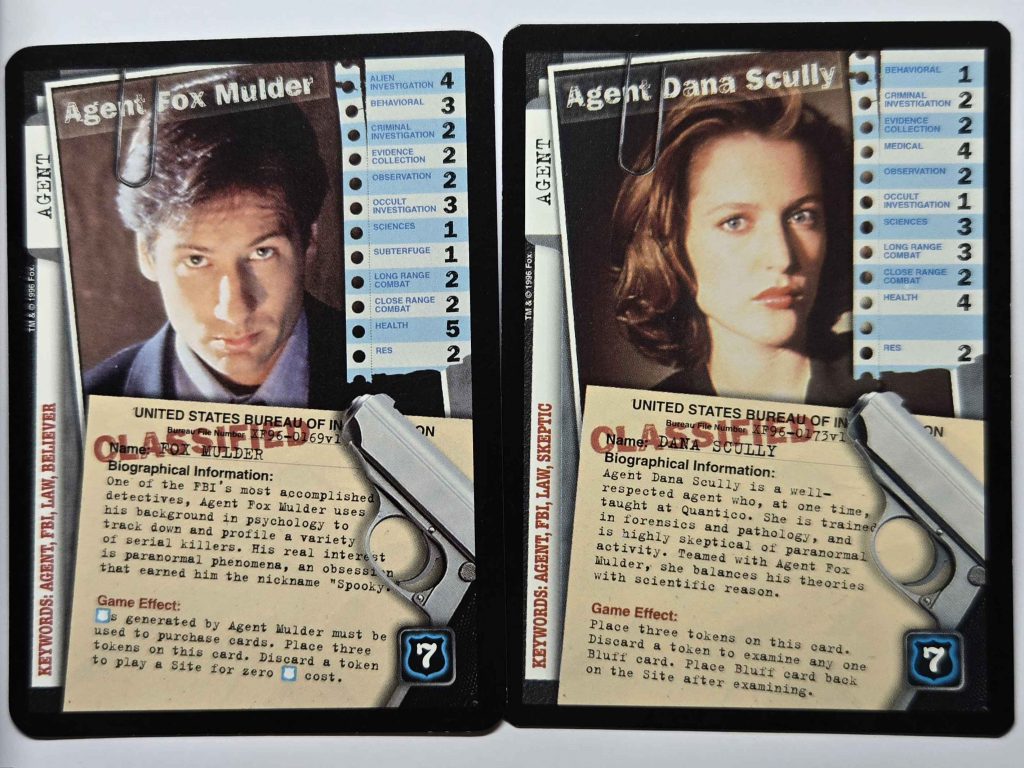
With the X-File and agents set, there are seven phases for each turn of the game: Briefing, Healing, Requisition, Deployment, Case Assignment, Investigation, and Debriefing. The game happens across three play areas: the bureau, the field, and the hospital. At the bureau, agents can pick up equipment to help them with their mission. In the field, agents perform investigations and engage in combat. At the hospital, wounded agents can recover from a lost fight.
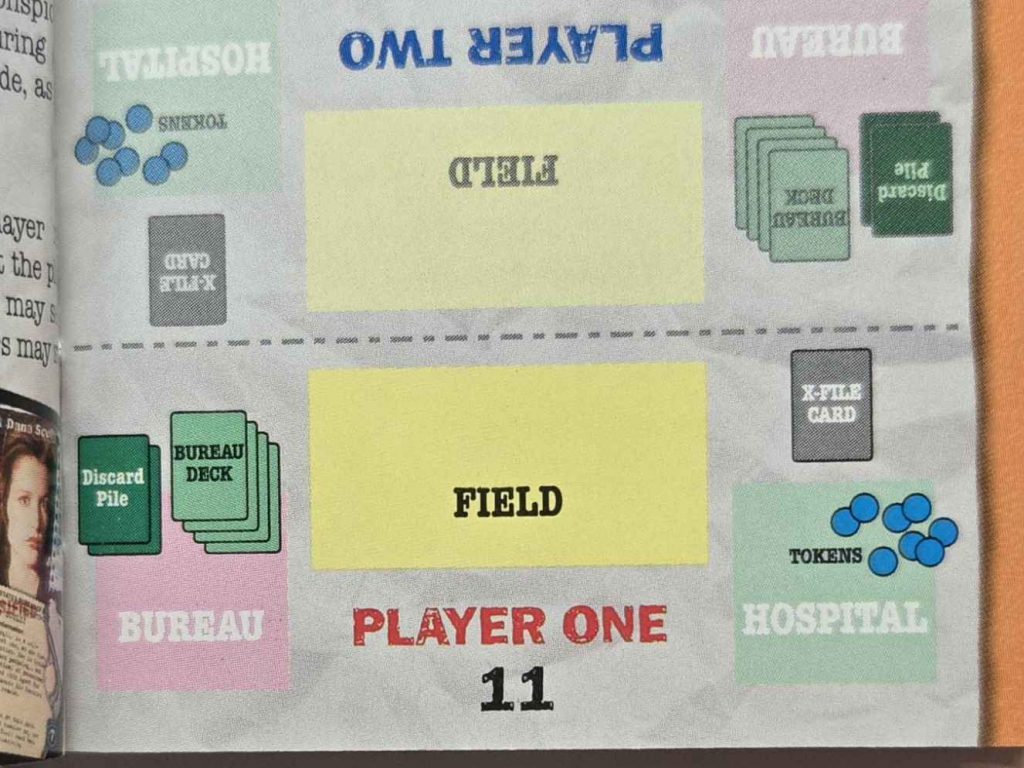
During the briefing phase, both players draw to a ten-card hand. When the deck is spent, players shuffle the discard pile and go through it again – so burning through your deck doesn’t mean a game over!
The healing phase represents an agent recovering from a previous fight with an adversary. In the basic game, adversaries are generic roadblocks for agents – if an adversary is not negated, an agent is sent to the hospital and given two injury tokens. Remove one of these tokens per healing phase.
The requisition phase lets agents (mainly at the bureau) pick up equipment. These cards largely deal with combat, and either increase damage or negate effects. Many of these cards aren’t as helpful (or straight-up aren’t usable) in the basic version of the game. I’ll speak a bit about deckbuilding later in the article, but we stayed light on these – especially as agents are most valuable when they are in the field.
The deployment phase is when agents move between the three locations – the bureau (for most requisitions), the field (for investigations) and the hospital (for getting better after the Eurisko AI kicks your ass). Most of the standard-issue FBI-style gear needs to be requisitioned from the bureau, which means that you will need to balance picking up your rental car versus checking out the Arecibo observatory.
The case assignment phase covers site cards being played. Each site only lasts until the end of the turn, when it is discarded. After that, the investigation phase sees the agents taking skill checks to see if you can earn the right to ask a question. For example, Aleister Crowley High School has a prerequisite of either Occult Investigation 5+ or Observation 5+ – meaning that your agents need to have a combined 5+ in one of those to pass the check and ask a question.
In the X-Files, Mulder and Scully never knock on someone’s door and solve the mystery immediately. Things always go to hell somehow or other. If my opponent is investigating, I want to stop them! This is where the “Skill Check Subroutine” comes in.
- The player making the check announces which agents are involved, which skill they are using, and and what the total skill check result is
- Each player can play up to three cards to assist or hinder this check
- This starts with the investigating player using a card, then the opponent using one, and so on until someone stops (or you hit three).
- If the skill check is still successful, ask away! If not, too bad.
A bunch of new cards come into play here, but they all follow the same general rules:
- ACTIVE: The current investigator of the turn can play this
- CONSPIRACY: played during your opponent’s turn
- KEYWORD: Some cards may only be played if the site has a specific keyword or type, (ex. Occult)
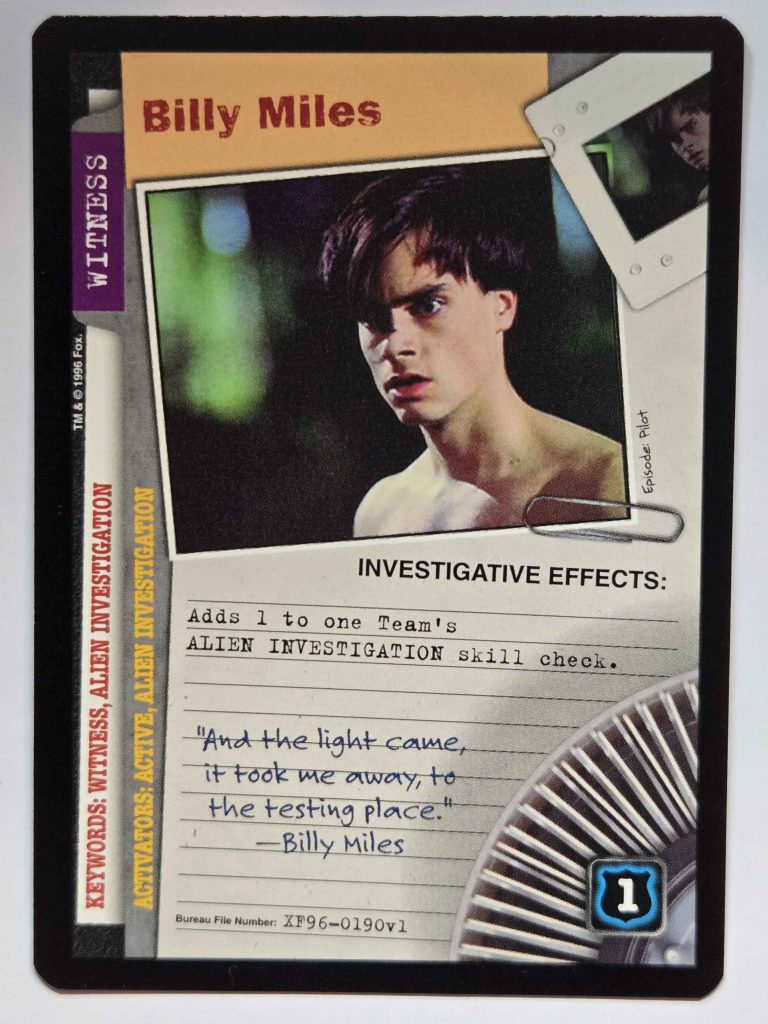
The opponent can play the previously mentioned adversaries at this point, attempting to stop an agent in their tracks. The active player could respond with a witness card. These may give the player a boost to skill checks, or mitigate a roadblock in their way. Billy Miles gives a +1 to a team’s alien investigation skill checks.
Bluff cards can be played to try and throw a player off. Final Repose lets you take any three cards from an opponent’s discard pile, and put them into the top of their bureau deck – you can place some less relevant cards so they may need to wait for another draw or two before they get something useful.
An event card may have a temporary (or semi-permanent) effect on the game as well. Jose Chung’s “From Outer Space” lets you block your opponent from asking questions about a different characteristic each turn. Langley removes a bluff attached to a site.
If the check is passed, the site will note what attribute you can ask a yes-or-no question about, such as “is your method subterfuge?”. If that answer is incorrect, cross out the results that don’t match, and get ready for your opponent’s turn! In the debriefing phase, players can discard up to three cards. Again – as you keep rolling through your deck, there is no penalty for running out of cards. You may find yourself throwing a bunch of cards out in one turn, and waiting around for your agents to heal up in the hospital for the next two.
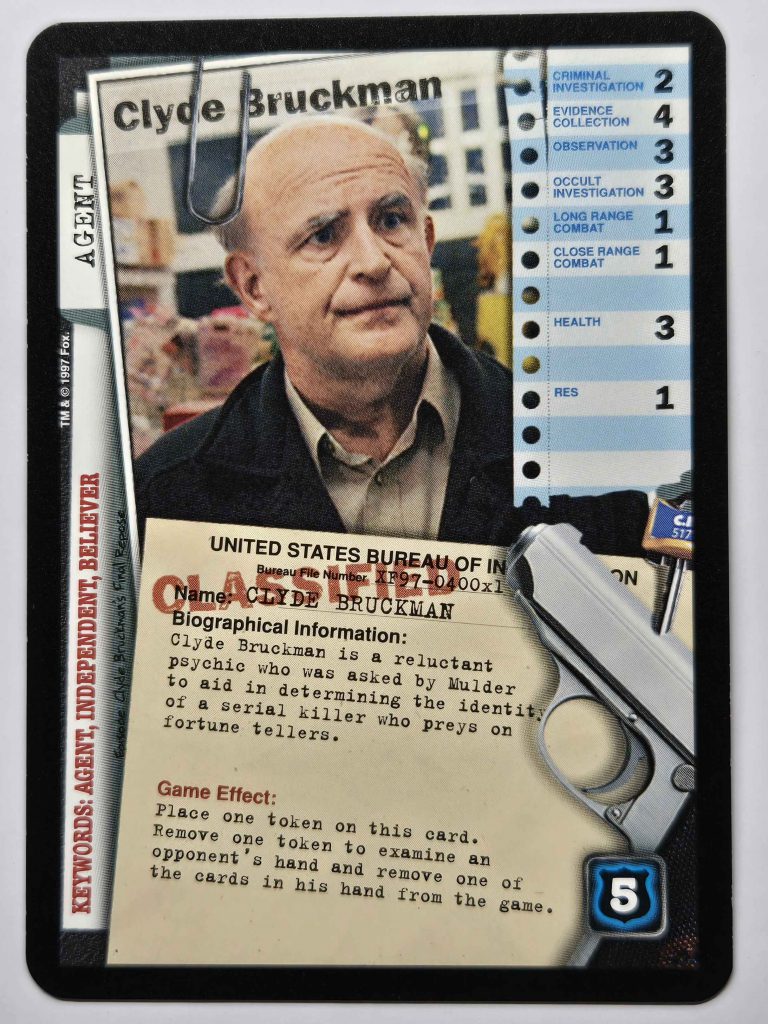
On Deckbuilding
I had absolutely no clue how to approach deckbuilding here, and found videos from jayman105 on Youtube to be particularly helpful (though keep in mind he is talking about Advanced Rules and competitive play). You want lots of sites, lots of events, and a seasoning of other stuff. Sites should be achievable by your selected agents, events should be a balance of offensive and defensive. If you are just looking to have some fun, friendly games, pick stuff from episodes you like!
How Does It Play?
When it is just the two of us, my wife and I tend to play cooperative games, but there is some magic with the setting here. For our first game, I played a slimeball / subterfuge team with Krycek, Colton, and Blevins… and felt kind of good getting beaten by Mulder and Scully. I would highly recommend listening to music cues from the show or a playlist inspired by it.
It’s worth noting that even the basic rules are pretty involved – it is definitely not a quick, pick-up-and-go game night sort of thing. Once we got an intro game down, the loop sunk in pretty well for us. As you get familiar, the number of cards flying around in an investigation check subroutine is likely to grow, with agents zooming between the hospital and the field. We’ve really enjoyed our time with the basic rules, and may dip our toes into advanced in the future. My only real complaint is that all of the cards (including some sealed boosters) have a strong woody, varnish-y smell instead of a “new cards” bouquet.
What Do I Need to Get Started?
You could play a perfectly alright game with a couple of starter packs, but look for 2-player sets or lots on eBay. Even if it’s just a pile of commons & uncommons, important characters and places are likely to show up. Prices are pretty reasonable, though the singles market is a bit sparse. I was happy to find that fans are working hard to keep the game alive. MM XFILESCCG, Alien Investigations, and many fans are regularly pumping out content – about the game, the history of it’s creation, tournaments, and unproduced card sets. If you have any interest in diving right down the rabbit hole, it is VERY deep.
Have any questions or feedback? Drop us a note in the comments below or email us at contact@goonhammer.com. Want articles like this linked in your inbox every Monday morning? Sign up for our newsletter. And don’t forget that you can support us on Patreon for backer rewards like early video content, Administratum access, an ad-free experience on our website and more.
